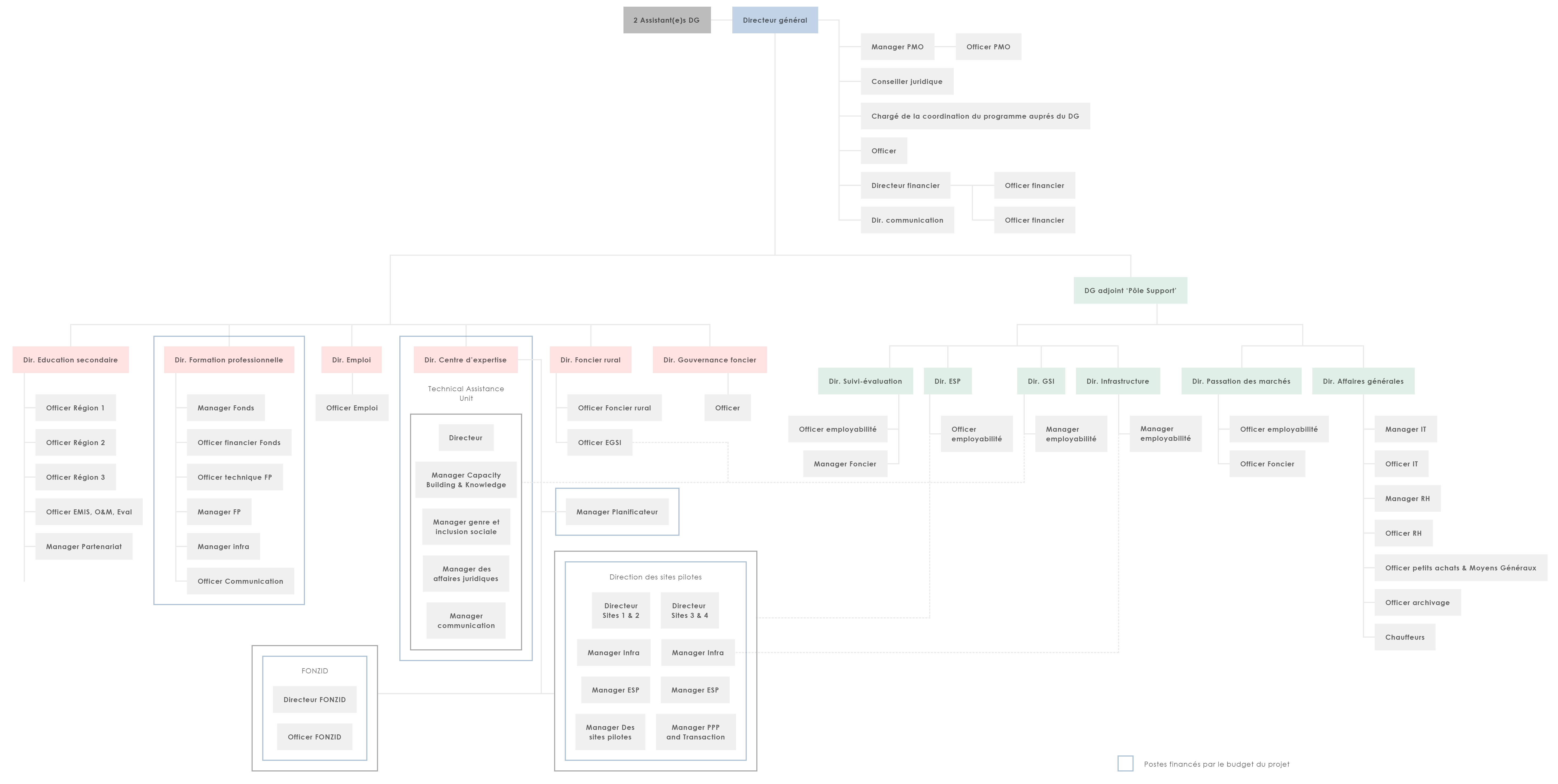Consultations
The participatory approach is a choice made by the Moroccan public authorities, which is in line with the MCC guidelines for the preparation and implementation of Compact II.
Thus, broad consultations were conducted throughout the development cycle of the Compact II, enriching the analysis of growth constraints and confirming its conclusions.
This includes in particular:
- Workshops from 18 to 22 September 2013: the purpose of these workshops was to initiate a debate leading to the identification of constraints to growth, in the fields of infrastructure, investment financing, human capital and micro and macro-economic distortions, etc. The aim of these workshops was to identify the constraints to growth.The HRV approach was presented to the participants, the data required for its implementation was identified and the structures responsible for providing it were designated, and these workshops were organized by the services of the Head of Government and facilitated by experts from MCC and the African Development Bank (AfDB), with the participation of representatives from ministerial departments, relevant public institutions and institutions, the private sector and academia.
- Workshops on November 13-14,2013: The purpose of these workshops is to examine the first conclusions of the study and to enrich the reflection on constraints to growth. The workshops were attended by AfDB experts, senior officials representing government and public institutions, the private sector and academia.
- Workshops for the validation of social and gender analysis (20-21 January 2014): These thematic workshops aimed at the restitution and validation of social and gender analysis. Thus, four themes were presented and discussed: education and training, employment and entrepreneurship, health and political participation. These meetings were attended by representatives of ministerial departments, national NGOs, women's organizations, particularly those involved in sectors related to poverty reduction and social inclusion and gender equality, and other key actors in this field.
- Enlarged workshops (20-29 January 2014): the aim here was to compare the conclusions of the study carried out with the different points of view expressed by the various actors at national, regional and local levels in order to complete, validate, reverse or nuance them.In addition to experts and officials representing relevant public and private administrations and institutions, these workshops have been extended to other key actors such as employers' organizations, civil society organizations and certain deconcentrated public institutions, technical and financial partners and resource persons recognized for their expertise in the various fields covered by the studies carried out, namely analysis of constraints to economic growth, evaluation of private sector investment opportunities and social and gender analysis.
List of participants in the various consultations
The consultative approach was also adopted in project design and development.
With regard to the project "Education and training for employability":
- Meeting with technical and financial partners, such as the World Bank, the French Development Agency (AFD) and the African Development Bank (AfDB), on key issues in the education and vocational training sector (2 October 2014).
- Consultation of the Higher Council for Education, Training and Scientific Research on the autonomy of institutions and information and evaluation systems (3 October 2014).
- Meeting with a civil society organisation "Education for Employment" on potential areas of cooperation for the compact (24 October 2014).
- Consultation of an international organisation "Discovery learning Allianz" on the use of multimedia in education (20 November 2014).
- Meeting with the founder of the "Moroccan Centre for Social Innovation" on the project of establishment and development of entrepreneurship spirit (10 December 2014).
- Consultation of a civil society organization:"Moroccan Coalition for Education for All" on the social/gender impact of the project, particularly in its PPP component (12 January 2015).
- Consultation of an international organization:"UN Women" on girls' access to education and women's access to the labour market (14 January 2015).
Concerning the "Land productivity" project:
- Visit of collectives at Gharb region level and meetings within the framework of focus groups with naïbs, rights holders and women beneficiaries (11 and 12 February 2015).
- Meeting with the President of the Chamber of Personal and Estate Status at the Court of Cassation and the Head of the Inter-domain Relations Department at the State Domains Directorate, on the issue of joint ownership (10 February 2015).
- Meeting with the heads of the National Agency for Land Conservation, Cadastre and Cartography (ANCFCC) at the central level, ANCFCC-Kenitra, ANCFCC-Sidi Slimane, ANCFCC-Souk Larabaa and ANCFCC-Sidi Kacem concerning the constraints related to collective land melkisation (9 February 2015).
- Meeting with a small group of experts on gender, legislation and rural/collective land (9 February 2015).
- Meeting with the Association Démocratique des Femmes du Maroc (ADFM) to gather their opinions on the development of collective land within irrigation perimeters and their contribution to regional debates on collective land (19 December 2014).
- Meeting with the operators' association of the Sidi Bernoussi industrial zone "Izdihar", about the problems experienced by the area's industrialists (18 December 2014).
- Meeting with donors (Delegations to Morocco of USAID, the African Development Bank, the French Development Agency and the European Commission) to discuss good practices to improve the quality of human capital and land productivity (December 16,2014).
- Participation in hearings with institutional actors and operators in the land sector, organized as part of the preparations for the National Conference on State land policy and its role in economic and social development (3 and 4 December 2015).
- Visit of the Chairman and CEO of MCC, Mrs. Dana Hyde, to the Bouskoura industrial park and meeting with the Director of industrial parks at the French Chamber of Commerce and Industry of Morocco (22 October 2014).
- Meetings with the Confédération Générale des Entreprises du Maroc (CGEM) on constraints to investment and entrepreneurship, including one with the participation of the CEO of MCC (22 October 2014).
- Meetings with several resource persons, rural land experts, on the collective land melkisation project.




